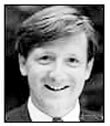Spokesperson refers to possible GOP backlash on city’s budget
At a June 1 meeting with his Gay, Lesbian and Transgender Advisory Committee, Williams had raised the hopes of same-sex marriage proponents when he said he planned to issue a directive to agency heads within 30 days.
Since May, 13 Massachusetts towns have issued marriage licenses to out-of-state same-sex couples. In response to an official query from Republican Gov. Mitt Romney, a staunch foe of same-sex marriage, the state attorney general, Thomas Reilly, a Democrat, declared those marriages invalid, citing an obscure 1913 state statute that prohibits the state from issuing licenses to couples whose marriages would not be recognized in their home state.
Various localities have sued the attorney general, as well as the registrar of vital records, who is responsible for recording marriages, arguing that the 1913 law is discriminatory and makes town clerks liable to punitive lawsuits solely for acting in a nondiscriminatory fashion.
In California, the Supreme Court is expected to rule this summer on the validity of the same-sex marriage licenses issued by San Francisco earlier this year. Before the high court halted their issuance, more than 4,000 same-sex couples obtained marriage licenses.
“We want this stuff to be straightened out before we make our own decision and add to the mix,” Bullock said in an interview. “In principle, the mayor supports gay marriage. This is not a philosophical or moral decision. It is our attempt to proceed in a lawful manner.”
Bullock added that since no Washington same-sex couple has petitioned for the recognition of their marriage, the matter was not particularly pressing.
Apparently, though, the uncertain fate of the pending court cases in Massachusetts and California is not the only reason Mayor Williams is withholding his decision. Bullock acknowledged that, according to the mayor’s reading of Washington law, there is no prohibition on recognition of same-sex marriage, and the mayor intends to clarify the city’s position. However, there are other factors to consider.
The District of Columbia receives its municipal funding from the federal government and falls under direct congressional oversight. Within the next two weeks, an appropriations subcommittee in the House of Representatives will decide the city’s budget. In the past, that subcommittee has attached what Bullock called “social riders” to the money, effectively overruling initiatives passed by the district’s voters. Measures that have won a popular vote, but were then invalidated by the subcommittee, include the legalization of marijuana for medical purposes and needle exchange programs to curb HIV and hepatitis transmissions among intravenous drug users.
The city’s home rule charter allows Congress to pass or repeal with a simple majority vote any law pertaining to the district.
“It’s just not the right time,” Bullock said. “This would be a major decision and might become national news. We certainly don’t want to provoke the wrath of our congressional overseers. They’re all going home to get themselves re-elected and would love to say they prevented the legalizing of same-sex marriage.”
Bullock said the city does not want to raise the ire of a Republican-led Congress that might not only ban same-sex marriage in Washington, but also prevent the district from recognizing same-sex marriages from other states.
“No other city or county has this kind of interference,” Bullock said. “We are still a colony.”
The district, which almost always elects Democrats such as Williams to citywide posts, successfully instituted a domestic partnership program, without congressional veto.
Bullock did not indicate how soon after the resolution of the Massachusetts and California court cases would Williams formalize the city’s policy on same-sex marriages.



































